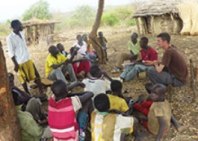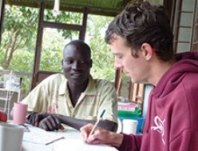Word Into Song
- December 23, 2013
 In a mud-walled church on Gesas mountain in Ethiopia, the Gumuz congregation stood around a big African drum, but instead of singing and stepping to the steady drumbeat, they were frustrated and bickering. Wycliffe Bible translators Travis ('02) and Andrea Williamson ('03) watched in dismay as Habtamu, one of their team of local Bible translators, attempted for the third time to teach the congregation a new song about creation he'd helped write in the traditional Gumuz style. Music is a prominent part of the Gumuz identity, and Travis had hoped the new song, based on their draft of Genesis 1, would help the oral Gumuz culture learn God's Word. "After five or so painful minutes, I was ready to pull the plug and admit defeat," he recalls.
In a mud-walled church on Gesas mountain in Ethiopia, the Gumuz congregation stood around a big African drum, but instead of singing and stepping to the steady drumbeat, they were frustrated and bickering. Wycliffe Bible translators Travis ('02) and Andrea Williamson ('03) watched in dismay as Habtamu, one of their team of local Bible translators, attempted for the third time to teach the congregation a new song about creation he'd helped write in the traditional Gumuz style. Music is a prominent part of the Gumuz identity, and Travis had hoped the new song, based on their draft of Genesis 1, would help the oral Gumuz culture learn God's Word. "After five or so painful minutes, I was ready to pull the plug and admit defeat," he recalls.
But Habtamu persevered. He repeated the song again and again until the women began experimenting with their traditional harmonization and the song hit its stride. After almost 30 minutes, the last word of the chorus finally completed its echo off the tin roof above their heads. "The air was electric as the Gumuz believers applauded their new song," Travis says. "God's Word in song was reaching down to the depths of Gumuz hearts, not only in the Gumuz language, but in the Gumuz musical style, translated, composed, and performed by Gumuz believers."
The Williamsons, who moved to Ethiopia in 2009, feel privileged to assist the Gumuz team in translating God's Word and making sure new Gumuz songs accurately reflect Scripture.
Ironically, Travis never planned to become a Bible translator when he arrived at Moody Bible Institute in 1998. He recalls telling God he'd be willing to do anything in missions except Bible translation, which he perceived as a boring desk job. That perception changed during Founder's Week 1999 when he heard Marilyn Laszlo, a Wycliffe Bible translator, share riveting stories of working hand-in-hand with a team of speakers in their mother tongue. Her description of a typical Bible translator-a Christian who is academic yet creative and works well with people-resonated with Travis, who went on to graduate with a B.A. in Applied Linguistics.
 Travis enjoyed studying linguistics under Moody professors Steve Clark and Andy Minch, especially "cracking the code of another culture's perception of the world," he says. "It was in the classrooms at Moody that God's call on my life to serve Him in Bible translation became crystal clear."
Travis enjoyed studying linguistics under Moody professors Steve Clark and Andy Minch, especially "cracking the code of another culture's perception of the world," he says. "It was in the classrooms at Moody that God's call on my life to serve Him in Bible translation became crystal clear."
Meanwhile, Andrea, whose father and grandfather were pilots, had chosen to pursue aviation at Moody. Despite becoming a licensed airplane mechanic after three years of training, however, she struggled to complete the rigorous program and finally chose a new major, graduating in 2003 with a B.A. in International Ministries.
"Moody's faculty modeled their faith and helped me develop a consistent relationship with Christ," she says.
After Travis and Andrea married in 2005, they pursued more theological and linguistic training in Dallas, Texas. To help pay bills, Andrea stopped at an airport and asked whether they needed an airplane mechanic. She recognized God's leading when the maintenance supervisor who met her turned out to be a former Moody classmate, Nate Killoren '03. "He hired me on the spot!" says Andrea, who renewed her confidence in airplane maintenance and in trusting God to open doors.
Both Andrea and Travis, who now have two young children, refer to Moody's tuition-paid education as a "huge blessing" that got them to the field without debt. In partnership with the Bible Society of Ethiopia and the Gumuz team, they hope to complete a translation of the Gospel of Luke by the end of 2013 and the New Testament by 2020.